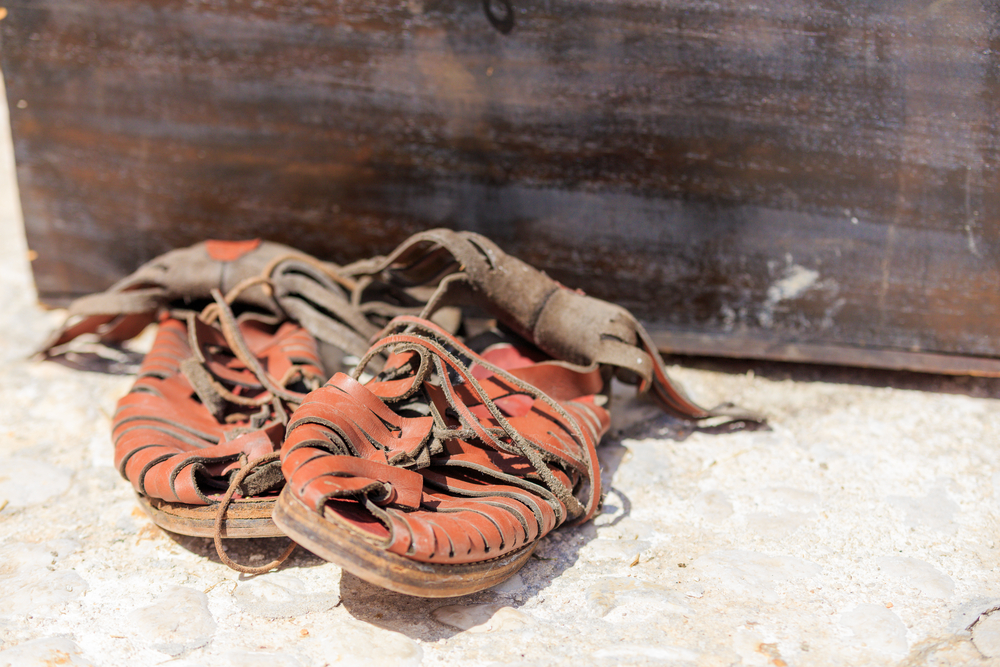
Then went Boaz up to the gate, and sat him down there: and, behold, the kinsman of whom Boaz spake came by; unto whom he said, Ho, such a one! turn aside, sit down here. And he turned aside, and sat down. (Ruth 4:1)
Boaz immediately sought to settle the matter. In ancient times, the gate of a city was like a town square with its courthouse in modern times. The gate was where people met, rulers judged, and legal transactions took place.
Boaz saw this kinsman approaching and called out to him to sit with him. The man agreed and sat down with Boaz. Then Boaz gathered some other men of the city to be witnesses of what would take place:
And he took ten men of the elders of the city, and said, Sit ye down here. And they sat down. (4:2)
The way that Boaz approached this “business transaction” was wise and rather impressive at that.
And he said unto the kinsman, Naomi, that is come again out of the country of Moab, selleth a parcel of land, which was our brother Elimelech’s: And I thought to advertise thee, saying, Buy it before the inhabitants, and before the elders of my people. (4:3-4a)
Boaz was careful to refer to Elimelech as “our brother,” showing that they were closely related. Boaz then stated the right of the closer relative to redeem Elimelech’s land.
If thou wilt redeem it, redeem it: but if thou wilt not redeem it, then tell me, that I may know: for there is none to redeem it beside thee; and I am after thee. And he said, I will redeem it. (4:4b)
Boaz made it clear that he was very interested in redeeming the land if the nearer relative didn’t want it. However, the kinsman stated that he wanted to redeem it. Then Boaz, in his keen business sense, disclosed the condition of buying the land:
Then said Boaz, What day thou buyest the field of the hand of Naomi, thou must buy it also of Ruth the Moabitess, the wife of the dead, to raise up the name of the dead upon his inheritance. (4:5)
Boaz was pretty shrewd here in his dealings. He knew that the other relative would understand the implications of redeeming Ruth along with the land. Now the kinsman knew that his redemption would not benefit his own family’s holdings but rather those of Naomi and Ruth.
And the kinsman said, I cannot redeem it for myself, lest I mar mine own inheritance: redeem thou my right to thyself; for I cannot redeem it. (4:6)
The closer relative was eager to acquire the land for his own family, but he was not willing to secure an inheritance for someone else’s. Ruth’s offspring would not bring any benefits to this kinsman. Ruth’s firstborn would be deemed an heir of Elimelech’s family and would be entitled to claim the deceased’s share of the inheritance.
The nearer kinsman declined the offer, giving Boaz first rights to redeem. Boaz gladly accepted that right. However, he was careful not to let his excitement keep him from sealing the transaction with the other kinsman. They had a unique custom back then for doing so:
Now this was the manner in former time in Israel concerning redeeming and concerning changing, for to confirm all things; a man plucked off his shoe, and gave it to his neighbour: and this was a testimony in Israel. Therefore the kinsman said unto Boaz, Buy it for thee. So he drew off his shoe. (4:7-8)
In our modern times, we rely on the signatures of the parties involved and of witnesses (a notary, typically). However, in these ancient times in Israel, they handled their legal transactions (at least those regarding redemption) in a different way.
The kinsman, forfeiting his right to the land, plucked off his shoe and gave it to Boaz. By doing this, he signified that he was giving up his right to tread upon the land as an owner would. He was surrendering all to Boaz.
And Boaz said unto the elders, and unto all the people, Ye are witnesses this day, that I have bought all that was Elimelech’s, and all that was Chilion’s and Mahlon’s, of the hand of Naomi. Moreover Ruth the Moabitess, the wife of Mahlon, have I purchased to be my wife, to raise up the name of the dead upon his inheritance, that the name of the dead be not cut off from among his brethren, and from the gate of his place: ye are witnesses this day. (4:9-10)
The ten men that Boaz had called together were witnesses of this transaction. Boaz made sure to include them so that no one would be able to say that he hadn’t done things legally. This again shows Boaz’s wisdom in handling this situation.
Boaz also boldly declared his intention to marry Ruth and to raise up an heir for the house of Elimelech.
And all the people that were in the gate, and the elders, said, We are witnesses. (4:11a)
Everyone present confirmed with Boaz and reassured him that they knew exactly what had happened; they would keep his testimony. Then they pronounced a blessing upon him and Ruth:
The LORD make the woman that is come into thine house like Rachel and like Leah, which two did build the house of Israel: and do thou worthily in Ephratah, and be famous in Bethlehem: And let thy house be like the house of Pharez, whom Tamar bare unto Judah, of the seed which the LORD shall give thee of this young woman. (4:11b-12)
As we will see next week, the Lord answered their prayers in a mighty way.
